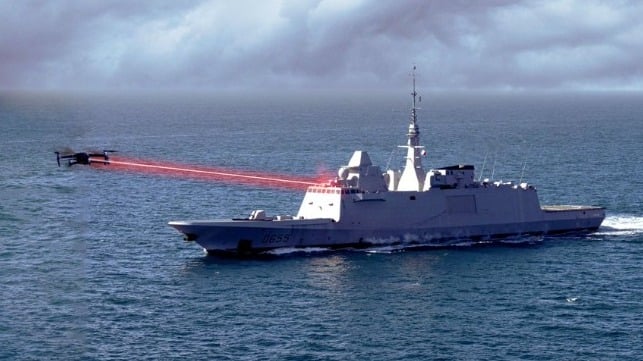French Navy Tests Laser Air-Defense System to Defeat Drones

Following the lead of the U.S. Navy, the French Navy will soon begin testing a laser-based anti-drone system for point defense, which would give it a new option for keeping its maritime assets safe from low-cost, explosives-laden drones and small craft.
Armed or bomb-laden drones are ubiquitous in modern combat, and drone surface craft have played a prominent role in at least one ongoing conflict, the Yemeni Civil War. French defense company CILAS has come up with one way to counteract these threats. Its HELMA-P laser platform can track drones in flight and shoot them down with a small two-kilowatt laser. It can be operated by a single user, and it has an effective range of about half a nautical mile, roughly on par with a standard Phalanx Close-In Weapons System. Despite its capabilities, it is small enough to fit handily into a shipping container for easy transport.
CILAS has been testing the laser system on target drones in France since last year, and it has shot down about three dozen so far. After the last trials finished on July 7, French armed forces minister Florence Parly said that given the promising results, the system deserved a test aboard a French Navy vessel.

In a statement, the Marine Nationale said that the HELMA-P turret has shown its capability on land, and it will be assessed aboard one of the service's vessels in 2022. After an initial series of experiments to ensure that the system runs properly in the marine environment, the service will take it to sea and test it against live drones.
"The Navy is interested in laser weapons because combat ships have very high computing power, space, a lot of energy and refrigeration capacities which predispose them to receive high power lasers," the service said. "These systems are capable of destroying or damaging many threats by controlling the effects and being able to renew the engagement without limitation."

that matters most
Get the latest maritime news delivered to your inbox daily.
The Marine Nationale did not name the vessel selected for the trial, but a photo accompanying the announcement showed the FS Forbin, the first of the new Horizon-class air-defense frigates.
The U.S. Navy has tested a more powerful anti-drone laser system, LaWS, aboard the amphibious transport dock USS Ponce. The German Navy is also testing a surface-to-air laser in the 20 kW class with technology provided by Rheinmetall, and the next step will be a yearlong trial phase onboard the frigate Sachsen.
